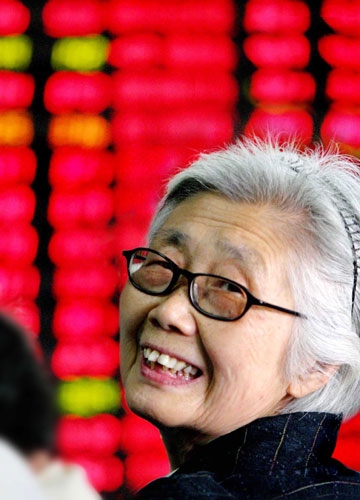China's stock market closed at its highest level in nearly two years
yesterday following the government's lifting of a one-year ban on share sales.
The benchmark Shanghai composite index finished 3.95 per cent higher at
1,497.104 points, its highest level since June 7, 2004, when it ended at
1,517.145 points. And the percentage gain on the first day after the week-long
May Day holiday was the biggest since June 8, 2005.

A stock investor
smiles broadly at an office of a securities company in Hangzhou, East
China's Zhejiang Province May 8, 2006. China's stock market surged
to its highest level in nearly two years after a yearlong moratorium
on new share sales by companies already traded on its exchanges was
lifted. [newsphoto] |
Shares in commodities, real
estate and the electronic power sectors saw a continuous increase on yesterday's
market. Analysts predicted the index will rise to 1,500 points in coming days.
"In the past, the rise of A shares used to be driven by the rise of H shares.
But now I do not believe that the climbing of the A-share index is much related
to the rise of H shares," Cheng Weiqing, an analyst with CITIC Securities, said.
A shares have been gaining in strength, buoyed by the government's series of
market-friendly measures since the beginning of 2006.
The China Securities Regulatory Commission lifted the one-year ban on shares
sales by issuing new rules on Sunday, saying that companies must meet 34
criteria to be eligible to sell stock, including three successive years of
profit and dividend payments equal to at least 20 per cent of income.
Compared to the old rules, companies are now subject to tougher restrictions
when selling shares. Share sales should not be bigger than 30 per cent of a
company's capital before the offering. Companies selling convertible bonds
should cap their total debt after the sale at less than 40 per cent of net
assets as of the end of the previous financial year.
The new rules also tighten supervision on the management of raised capital
and establish standards for private share sales before they go public.
Currently more than 200 companies out of more than 1,300 listed firms are
able to sell shares in the Shanghai and Shenzhen bourses. Around 30 companies
have submitted applications to the CSRC to float more shares.
The figures are encouraging for domestic securities firms and the lifted ban
immediately revived their underwriting business.
The ban on share sales in the Shanghai and Shenzhen stock exchanges has
thrown securities firms into confusion since May 2005. Most of them have barely
managed to scrape by over the past 12 months.
Some have been able to make money by servicing listed companies to convert
non-tradable State-owned shares. But these profits are nothing compared to the
income that can be generated by underwriting.
"A securities firm can get commissions of between 1.5 and 3 per cent by
underwriting new share sales. But the profit from servicing listed companies to
convert shares is only one-tenth of the underwriting business," Dong Chen, an
analyst with CITIC Securities, told China Daily.
Up until April, 70 per cent of listed companies had completed the conversion
of their non-tradable shares into tradable ones. With the lifting of the ban,
securities firms could shift their focus from reforms to the flotation of new A
shares.
CITIC's Cheng pointed out that as nonferrous metals including copper,
aluminium and gold will continue to climb, investors should also pay attention
to the possible rise of steel and construction materials shares based on
speculation that they will recover from the slump.
China kicked off its securities reform and suspended simultaneously the
launch of IPO and share sales on April 29, 2005. A shares have staged a strong
rebound in 2006. The benchmark Shanghai composite index has increased 27 per
cent since the beginning of 2006.
(China Daily 05/09/2006 page11)